现代大学英语精读1第二版第九课课文分析
- 格式:ppt
- 大小:727.00 KB
- 文档页数:33
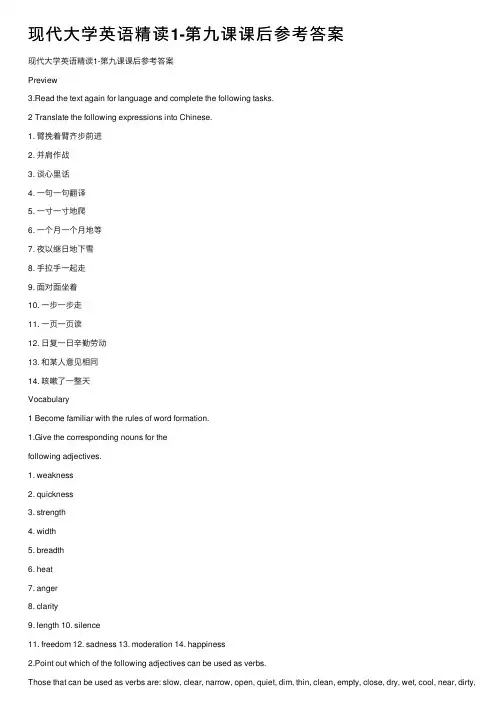
现代⼤学英语精读1-第九课课后参考答案现代⼤学英语精读1-第九课课后参考答案Preview3.Read the text again for language and complete the following tasks.2 Translate the following expressions into Chinese.1. 臂挽着臂齐步前进2. 并肩作战3. 谈⼼⾥话4. ⼀句⼀句翻译5. ⼀⼨⼀⼨地爬6. ⼀个⽉⼀个⽉地等7. 夜以继⽇地下雪8. ⼿拉⼿⼀起⾛9. ⾯对⾯坐着10. ⼀步⼀步⾛11. ⼀页⼀页读12. ⽇复⼀⽇⾟勤劳动13. 和某⼈意见相同14. 咳嗽了⼀整天Vocabulary1 Become familiar with the rules of word formation.1.Give the corresponding nouns for thefollowing adjectives.1. weakness2. quickness3. strength4. width5. breadth6. heat7. anger8. clarity9. length 10. silence11. freedom 12. sadness 13. moderation 14. happiness2.Point out which of the following adjectives can be used as verbs.Those that can be used as verbs are: slow, clear, narrow, open, quiet, dim, thin, clean, empty, close, dry, wet, cool, near, dirty,short---shorten strong---strengthen dark---darkenhot---heatbright---brighten sad---saddenred---reddenripe---ripenweak---weaken wide---widenthick---thicken quick---quicken cold---cool low---lower angry---angerhard---harden deep---deepenlong---lengthen (long在此作“长的”解,如作动词,意为“盼望”) broad---broadenfat---fattenlight---lighten (light这⾥作“轻的”解,如作动词,意为“点⽕”)soft---softenhigh---heighten3.Fill in the blanks with the correct form ofthe word “impress”.1. impressed2. impression3. impressed4. impressive5. impressionist6. impressionable2 Complete and translate the following expressions./doc/138548081.htmlplete the following verb + nounexpression.1. bag/pocket/gun2. stone/line/glance/doubt/vote3. keep4. make/fix/keep/have/break5. have6.one’s arm/animals/a prisoner/news7. club/arms/legs/stick9. strike10. one’s hand/a rope/meanings/anopportunity11. paper/map/tablecloth/plan5.Translate the following adjective + noun expressions into Chinese.1. 警惕的眼光,尚未点上的雪茄,奇数,对⾯,同声传译,和平共处,和平环境2. 常规做法,正常关系,常⼈,⼀般情况3. ⾚脚,头上不戴帽⼦,⾚⼿空拳,最低限度的必需品4. 直线,直路,直截了当的回答,绷着脸不笑5. 稍有增加,略有不同,轻微的程度,微笑的变化6. 宽阔结实的下颚,宽阔解释的肩膀,⽅形的花园,平⽅⽶7. 锐利的⽬光,强烈的兴趣,精明的头脑,敏锐的感觉8. 精明的头脑,锋利的⼑,利齿,说话尖酸刻薄,急剧增加,针锋相对的回答,急转弯,剧烈的疼痛,尖锐的批评,尖刻的评论,强烈的对⽐,尖锐的⽃争9. 稳定的⼯作,稳定的收⼊,稳定的增长,稳定的关系3 Give corresponding synonyms and antonyms for the following words and expressions 1Synonyms1. only just2. attempt3. stick4.smart/bright/shar p/keen5. throw6.think/suppose/gues s/believe7. good-looking8. catch9. talk10. cold11. move to and fro13. from time to time14. eat15. appear16. sharp17. rational18. shake2Antonyms1. abnormal2. considerable/great3. minority4. brighten5.roughly/approxim ately6. misfortune7.unsteady/shaky8. fill9. inferiority10. quicken11. software (如hardware作硬件解)12. uninteresting/bori ng/dull13. almost14. cheerfully4 Fill in the blanks with the correct form of the expressions listed below. Some expressions may be used more than once.6.under arrest7.get stuck/lose track of8.lose track of9.heard from10.change… into11.in existence 12.know of/doc/138548081.htmlpete with, catch up14.brought up, on earth, for show 15.asking for, torn down5 Fill in the blanks with the correct prepositions or adverbs.16.into, into18.from, up, in, for19.by, off 20.on, over21.out22.out, on23.over24.to, At, up 25.for, on6 Translate the following sentences into English.26.他开始事业很成功,但不久就被成功冲昏了头脑。
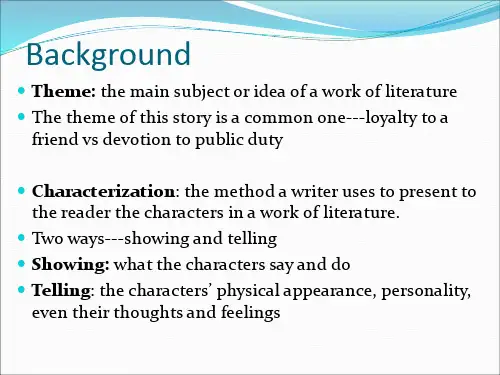
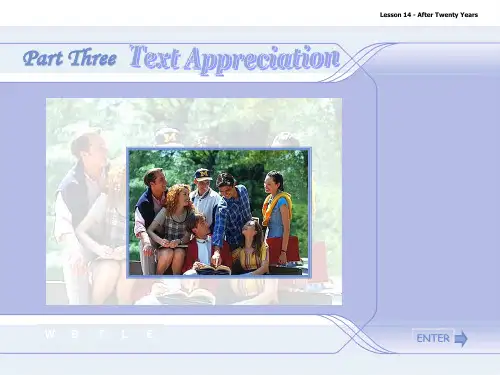
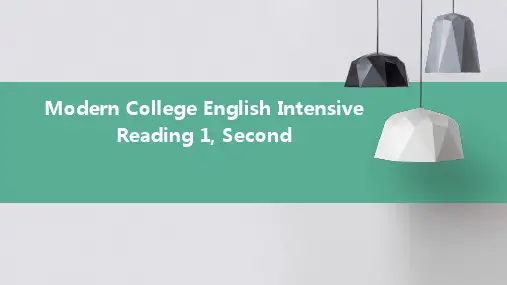
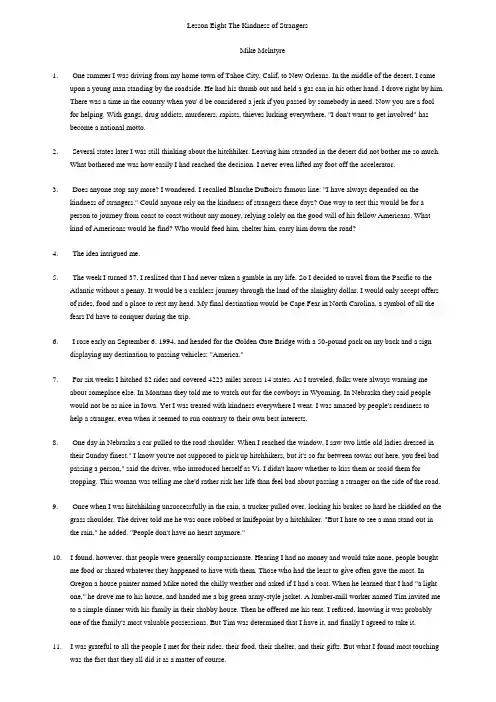
Lesson Eight The Kindness of StrangersMike Mclntyre1. One summer I was driving from my home town of Tahoe City, Calif, to New Orleans. In the middle of the desert, I cameupon a young man standing by the roadside. He had his thumb out and held a gas can in his other hand. I drove right by him.There was a time in the country when you' d be considered a jerk if you passed by somebody in need. Now you are a fool for helping. With gangs, drug addicts, murderers, rapists, thieves lurking everywhere, "I don't want to get involved" has become a national motto.2. Several states later I was still thinking about the hitchhiker. Leaving him stranded in the desert did not bother me so much.What bothered me was how easily I had reached the decision. I never even lifted my foot off the accelerator.3. Does anyone stop any more? I wondered. I recalled Blanche DuBois's famous line: "I have always depended on thekindness of strangers." Could anyone rely on the kindness of strangers these days? One way to test this would be for a person to journey from coast to coast without any money, relying solely on the good will of his fellow Americans. What kind of Americans would he find? Who would feed him, shelter him, carry him down the road?4. The idea intrigued me.5. The week I turned 37, I realized that I had never taken a gamble in my life. So I decided to travel from the Pacific to theAtlantic without a penny. It would be a cashless journey through the land of the almighty dollar. I would only accept offers of rides, food and a place to rest my head. My final destination would be Cape Fear in North Carolina, a symbol of all the fears I'd have to conquer during the trip.6. I rose early on September 6, 1994, and headed for the Golden Gate Bridge with a 50-pound pack on my back and a signdisplaying my destination to passing vehicles: "America."7. For six weeks I hitched 82 rides and covered 4223 miles across 14 states. As I traveled, folks were always warning meabout someplace else. In Montana they told me to watch out for the cowboys in Wyoming, In Nebraska they said people would not be as nice in Iowa. Yet I was treated with kindness everywhere I went. I was amazed by people's readiness to help a stranger, even when it seemed to run contrary to their own best interests.8. One day in Nebraska a car pulled to the road shoulder. When I reached the window, I saw two little old ladies dressed intheir Sunday finest." I know you're not supposed to pick up hitchhikers, but it's so far between towns out here, you feel bad passing a person," said the driver, who introduced herself as Vi. I didn't know whether to kiss them or scold them forstopping. This woman was telling me she'd rather risk her life than feel bad about passing a stranger on the side of the road.9. Once when I was hitchhiking unsuccessfully in the rain, a trucker pulled over, locking his brakes so hard he skidded on thegrass shoulder. The driver told me he was once robbed at knifepoint by a hitchhiker. "But I hate to see a man stand out in the rain," he added. "People don't have no heart anymore."10. I found, however, that people were generally compassionate. Hearing I had no money and would take none, people boughtme food or shared whatever they happened to have with them. Those who had the least to give often gave the most. In Oregon a house painter named Mike noted the chilly weather and asked if I had a coat. When he learned that I had "a light one," he drove me to his house, and handed me a big green army-style jacket. A lumber-mill worker named Tim invited me to a simple dinner with his family in their shabby house. Then he offered me his tent. I refused, knowing it was probably one of the family's most valuable possessions. But Tim was determined that I have it, and finally I agreed to take it.11. I was grateful to all the people I met for their rides, their food, their shelter, and their gifts. But what I found most touchingwas the fact that they all did it as a matter of course.12. One day I walked into the chamber of commerce in Jamestown, Tenn. to find out about camping in the area. The executivedirector, Baxter Wilson, 59, handed me a brochure for a local campground. Seeing that it cost $12, I replied, "No, that's all right. I'll try something else." Then he saw my backpack. "Most people around here will let you pitch a tent on their land, if that's what you want," he said. Now we're talking, I thought. "Any particular direction?" I asked. "Tell you what. I've got a big farm about ten miles south of here. If you're here at 5:30, you can ride with me."13. I accepted, and we drove out to a magnificent country house. Suddenly I realized he'd invited me to spend the night in hishome. His wife, Carol, a seventh-grade science teacher, was cooking a pot roast when we walked into the kitchen. Baxter explained that local folks were "mountain stay-at-home people" who rarely entertained in their house. "When we do," he said, "it's usually kin." This revelation made my night there all the more special.14. The next morning when I came downstairs, Carol asked if I'd come to their school and talk to her class about my trip. Iagreed, and before long had been scheduled to talk to every class in the school. The kids were attentive and kept asking all kinds of questions: Where were people the kindest? How many pairs of shoes did you have? Did anybody try to run you over? Did you fall in love with someone? What were you most afraid of?15. Although I hadn't planned it this way, I discovered that a patriotic tone ran through the talks I gave that afternoon. I told thestudents how my faith in America had been renewed. I told them how proud I was to live in a country where people were still willing to help. I told them that the question I had had in mind when I planned this journey was now clearly answered.In spite of everything, you can still depend on the kindness of strangers.第八课陌生人的仁慈1一个夏天,我正驱车从我的家乡加利福尼亚州的塔霍湖市前往新奥尔良。
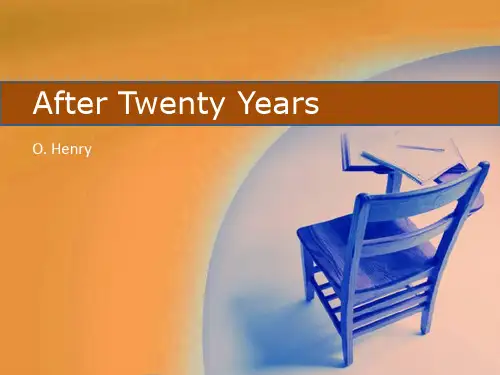
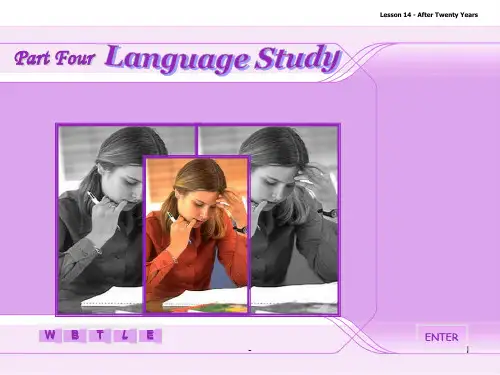
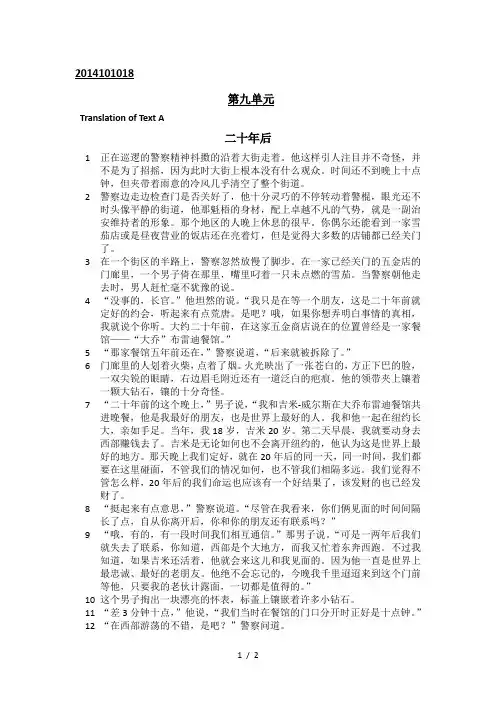
2014101018第九单元Translation of Text A二十年后1正在巡逻的警察精神抖擞的沿着大街走着。
他这样引人注目并不奇怪,并不是为了招摇,因为此时大街上根本没有什么观众。
时间还不到晚上十点钟,但夹带着雨意的冷风几乎清空了整个街道。
2警察边走边检查门是否关好了,他十分灵巧的不停转动着警棍,眼光还不时头像平静的街道,他那魁梧的身材,配上卓越不凡的气势,就是一副治安维持者的形象。
那个地区的人晚上休息的很早。
你偶尔还能看到一家雪茄店或是昼夜营业的饭店还在亮着灯,但是觉得大多数的店铺都已经关门了。
3在一个街区的半路上,警察忽然放慢了脚步。
在一家已经关门的五金店的门廊里,一个男子倚在那里,嘴里叼着一只未点燃的雪茄。
当警察朝他走去时,男人赶忙毫不犹豫的说。
4“没事的,长官。
”他坦然的说。
“我只是在等一个朋友,这是二十年前就定好的约会,听起来有点荒唐。
是吧?哦,如果你想弄明白事情的真相,我就说个你听。
大约二十年前,在这家五金商店说在的位置曾经是一家餐馆——“大乔”布雷迪餐馆。
”5“那家餐馆五年前还在,”警察说道,“后来就被拆除了。
”6门廊里的人划着火柴,点着了烟。
火光映出了一张苍白的,方正下巴的脸,一双尖锐的眼睛,右边眉毛附近还有一道泛白的疤痕。
他的领带夹上镶着一颗大钻石,镶的十分奇怪。
7“二十年前的这个晚上,”男子说,“我和吉米-威尔斯在大乔布雷迪餐馆共进晚餐,他是我最好的朋友,也是世界上最好的人。
我和他一起在纽约长大,亲如手足。
当年,我18岁,吉米20岁。
第二天早晨,我就要动身去西部赚钱去了。
吉米是无论如何也不会离开纽约的,他认为这是世界上最好的地方。
那天晚上我们定好,就在20年后的同一天,同一时间,我们都要在这里碰面,不管我们的情况如何,也不管我们相隔多远。
我们觉得不管怎么样,20年后的我们命运也应该有一个好结果了,该发财的也已经发财了。
8“挺起来有点意思,”警察说道。
“尽管在我看来,你们俩见面的时间间隔长了点,自从你离开后,你和你的朋友还有联系吗?”9“哦,有的,有一段时间我们相互通信。


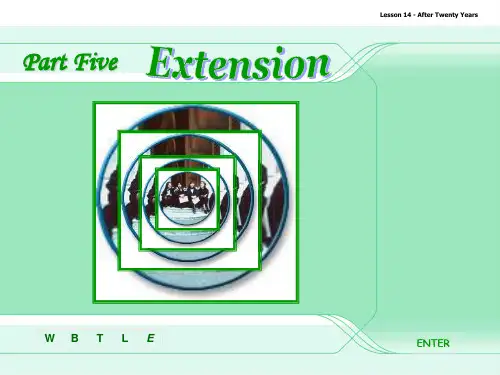
课文翻译(Unit1——10)第一单元Translation of Text A半日1我走在父亲的一侧,牢牢地抓着他的右手。
我身上穿的,戴的全是新的:黑鞋子,绿校服,红帽子。
然儿我一点儿也高兴不起来,因为今天我将第一次被扔到学校里去。
2母亲站在窗前望着我们缓缓前行,我也不时的回头看她,希望她会救我。
我们沿着街道走着,街道两旁是花园和田野,田野里栽满了梨树和椰枣树。
3“我为什么要去上学?”我问父亲,“是我做错了什么了吗?”4“我不是在惩罚你,”父亲笑着说道,“上学不是一种惩罚。
学校是把孩子培养成才的地方。
难道你不想象你哥哥们那样,成为一个有用的人吗?”5我不相信他的话。
我才不相信把我从家里拽出来,扔进那个大大的,高墙围绕的建筑里对我有什么真正的好处呢。
6到了学校门口,我们看到了宽阔的庭院,站满了孩子。
“自己进去吧,”我父亲说,“加入他们。
笑一笑,给其他的孩子做个好榜样。
”7我紧抓着父亲的手,犹豫不决。
但是父亲却把我轻轻地推开了。
“拿出点男子气概来,”他说,“从今天起你就要真正开始自己的生活了。
放学时我会在这等你的。
”8我走了几步,便看见了一些孩子的面孔。
他们中我一个也不认识。
他们也没有一个认识我的。
我感觉自己像是一个迷了路的陌生人。
然而这时有些男孩开始好奇的打量我,其中一个走过来问到,“谁带你来的?”9“我爸爸”我小声说道。
10“我爸爸死了,”他简短地说。
11我不知道该说些什么。
这时学校的门已经关上了,有些孩子哭了起来。
接着,铃响了,一位女士走了过来,后面跟着一群男人。
那些人把我们排成几行。
使我们形成一个错综复杂的队行,站在那四周高楼耸立的院子里。
每层楼都有长长的阳台,阳台上带有木制顶棚,从阳台上可以俯视到我们。
12“这是你们的新家,”那位女士说道,“这儿有你们的父母。
一切能带给你们快乐,对你们有益的事物,这儿都有。
因此擦干你们的眼泪,快快乐乐地面对生活。
”13这样看来我之前的顾虑都是毫无根据的了。
现代大学英语精读1第二版9-16单元课Unit 9Key to ExerciseVocabulary6 Translate the following sentences into English答案:1. At first, he was very successful in his business, but thenhis success turned his head.His partners advised him to be more modest, but he turned a deaf ear to their advice.2.Jingke was very confident/sure that when he unfolded the map he would be able to kill the Emperor of Qin with the sharp knife/dagger hidden in it.3. We ought to welcome more and more wealthy people, but ourlaw must make sure that they have made their fortune in honest ways.4. For years our school has produced many good students, mostof whom have important positions in various departments.5. Due to cultural differences many foreigners are turned offat the sight of dog meat or cat meat.6.Whenever you have time,turn it over in your mind,will you?7. She used to consider philosophy dull and boring, but latershe found that it turned out to be very interesting.8. His father had just turned fifty, and his hair has turnedgray, but otherwise, he is quite all right.9.The power of government officials must be checked and balanced. Otherwise those who are supposed to be people’s servants will turn into people’s m asters.10. He believed that it was worth trying because he knew thatwhatever you do, you must have people’s support.Grammar1 Translate the Chinese答案:1. no matter what / whatever happens2. no matter how old/young they are, whatever their age (is)3. No matter what/ Whatever you say4. no matter how much it costs5. No matter where/ Wherever his business took him6. No matter how / However we tried to reassure her7. no matter where/ wherever you are in the world8.no matter how/however difficult your workmates/colleagues are9. no matter how/ however difficult that is10. no matter what /whatever will happen to them2 Complete the response to each of the remarks using the wish+ that-clause pattern as shown in the examples.答案1.I had realized this2.I could help3.I had a brother4. I had his courage5. We could do more than we did6. I lived7. I hadbetter news8.we could be 9.she had listened to 10.I had been taught3Translate the following sentences,using a conditional clause …答案1. Wherever he goes, he is recognized.2. No matter how hard I try, I can’t persuade him to playthe part of Hamlet.3.No matter what you have planned for the future,your parents will support you.4. The boy hates crime and means to stop it whenever he can.5.No matter what you decide in the end,this digital dictionary is yours to keep for a semester.6. No matter how capable and efficient you are, you cannotfinish the task on your own in three days.7. A well-known philosopher once said,‘ I eat and drink what ever I like, and sleep whenever I cannot keep awake. I am in good health.’8.I wish I could go and see my parents whenever I want.9. I wish I could express openly whatever I feel.10.I’ll do whatever I can to restore law and order in the region.But I wish the riot had never happened.4 Fill in each blank with ONE suitable word.答案:1. since2. has3. popular4. idea/ practice5. relationships6. ways7. tradition8. among/ with9. longer 10.text5 Identify and correct the mistakes in each of the sentences 答案:1. This free copy is yours no matter whether/ if you buy anyof our books. / This free copy is yours whether you buy any of ourbooks or not.2. Wherever the people want us to go, we’d go there.3. In some ways we whish we could turn the clock back.4. On parting, the three of them decided to meet again at thesame place in ten years.5. I wish my parents were as understanding as yours.6. The hotel treats its guests equally, no matter where theyare from.7. His family and friends are all worried about him, for theyhaven’t heard from him for six weeks./As his family and friends haven’t heard from him for six weeks,they are all worried about him.8. All these years, I have kept track of the progress of theproject.9. Toward 10 pm, the man in the doorway became anxious; he wasnot sure whether his friend would come./Toward 10pm,the man in the doorway became anxious,for he was not sure whether his friend would come.10. I wish the earthquake had never happened.Unit 10Key to exerciseVocabulary2Complete the following verb+noun collocations or expressions答案:1. have / get / show / produce/ achieve the results2.have /take /accept /show /bear /assume responsibility3.discuss /debate /raise/settle/confuse /avoid issues4. pursue / have / develop hobbies5. have / make / lose / avoid contact6. save face / lives / time / money/ trouble7. remove roots / chairs/ hats / gloves / shoes / bandages/ make-up/ doubts8. cultivate land / field / roses/9.eliminate enemies /rivals /opponents /suspects /errors10. produce oil / cars / cotton / results / a movie/doc/0e2948734.html,ck care /time /money /experience /patience /courage12. bury the dead / treasure / past / head13 nourish the plants / children / animals / relationship14.arrange meeting /appointments /time /place /flowers / business affairs6. Translate the following sentences into English答案:1.如果他们拒绝归还小岛,他们两国的关系就不能完全正常化。
大学英语精读第一册Unit9课文大学英语精读第一册Unit9课文导语:大学英语精读对一些常用词和词组的用法分析到位,下面YJBYS店铺提供一篇大学英语精读的课文,欢迎学习!TEXTThroughout the ages different ideas have been expressed about the working of the human brain. It is only recently, however, that science has begun to give us some idea of how the brain really works.The BrainThe Most PowerfulComputer in the UniverseMan still has a lot to learn about the most powerful and complex part of his body -- the brain.In ancient times men did not think that the brain was the centre of mental activity. Aristotle the philosopher of ancient Greece thought that the mind was based in the heart. It was not until the 18th century that man realised that the whole of the brain was involved in the workings of the mind.During the 19th century scientists found that when certain parts of the brain were damaged men lost the ability to do certain things. And so, people thought that each part of the brain controlled a different activity. But modern research has found that this is not so. It is not easy to say exactly what each part of the brain does.In the past 50 years there has been a great increase in the amount of research being done on the brain. Chemists and biologists have found that the way the brain works is far more complicated that they had thought. In fact many people believethat we are only now really starting to learn the truth about how the human brain works. The more scientists find out, the more questions they are unable to answer. For instance, chemists have found that over 100,000 chemical reactions take place in the brain every second. Mathematicians who have tried to use computers to copy the way the brain works have found that even using the latest electronic equipment they would have to build a computer which weighed over 10,000 kilos. Some recent research also suggests that we remember everything that happens to us. We may not be able to recall this information, but it is all stored in our brains.Scientists hope that if we can discover how the brain works, the better use we will be able to put it to. For example, how do we learn language? Man differs most from all the other animals in his ability to learn and use language but we still do not know exactly how this is dine. Some children learn to speak and read and write when they are very young compared to average children. But scientists are not sure why this happens. They are trying to find out whether there is something about the way we teach language to children which in fact prevents children from learning sooner.Earlier scientists thought that during a man's lifetime the power of his brain decreased. But it is now thought that this is not so. As long as the brain is given plenty of exercise it keeps its power. It has been found that an old person who has always been mentally active has a quicker mind than a young person who has done only physical work. It is now thought that the more work we give our brains, the more work they are able to do.Other people now believe that we use only 1% of our brains' full potential. They say that the only limit on the power of thebrain is the limit of what we think is possible. This is probably because of the way we are taught as children. When we first start learning to use our minds we are told what to do, for example, to remember certain facts, but we are not taught how our memory works and how to make that best use of it. We are told to make noted hut we are not taught how our brains accept information and which is the best way to organise the information we want our brains to accept.This century man has made many discoveries about the universe -- the world outside himself. But he has also started to look into the workings of that other universe which is inside himself -- the human brain.NEW WORDScomputern. machine that stores information and works out answers 计算机universen. 宇宙complexa. difficult to understand or explain 错综复杂的,难懂的'ancienta. in or of times long ago 古代的;古老的philosophern. 哲学家philosophyn. 哲学involvevt. cause to become connected or concerned 使卷入workingn. (usu. pl.) operation; action 运转,运行,活动n. 能力exactlyad. with complete connected or concerned 确切地;精确地amountn. 数量,数额chemistn. one who studies and understands chemistry 化学家biologistn. one who studies the life of animals and plants 生物学家biologyn. 生物学complicatedn. difficult to understand, complex 难懂的;复杂的chemicala. of chemistryunablea. not ablereactionn. 反应mathematiciann. one who studies and understands mathematics 数学家equipn. 设备,装置kilo = kilogram公斤,千克recenta. done or made not long ago 近来的recallvt. remember 记得;回忆起vi. be different (from)mentallyad. 智力上,脑力上physicala. of the body; of matter; of the science of physics 身体的;物质的;物理学的potentialn. 潜力limitn. 局限,限度PHRASES & EXPRESSIONSput...to (good) useuse (in a profitable) (好好)利用differ frombe dissimilar to 与...不同compared to / within comparison with 与...相比make notestake notes 记笔记look intoexamine 调查,观察PROPER NAMESAristotle亚里士多德Greece希腊。